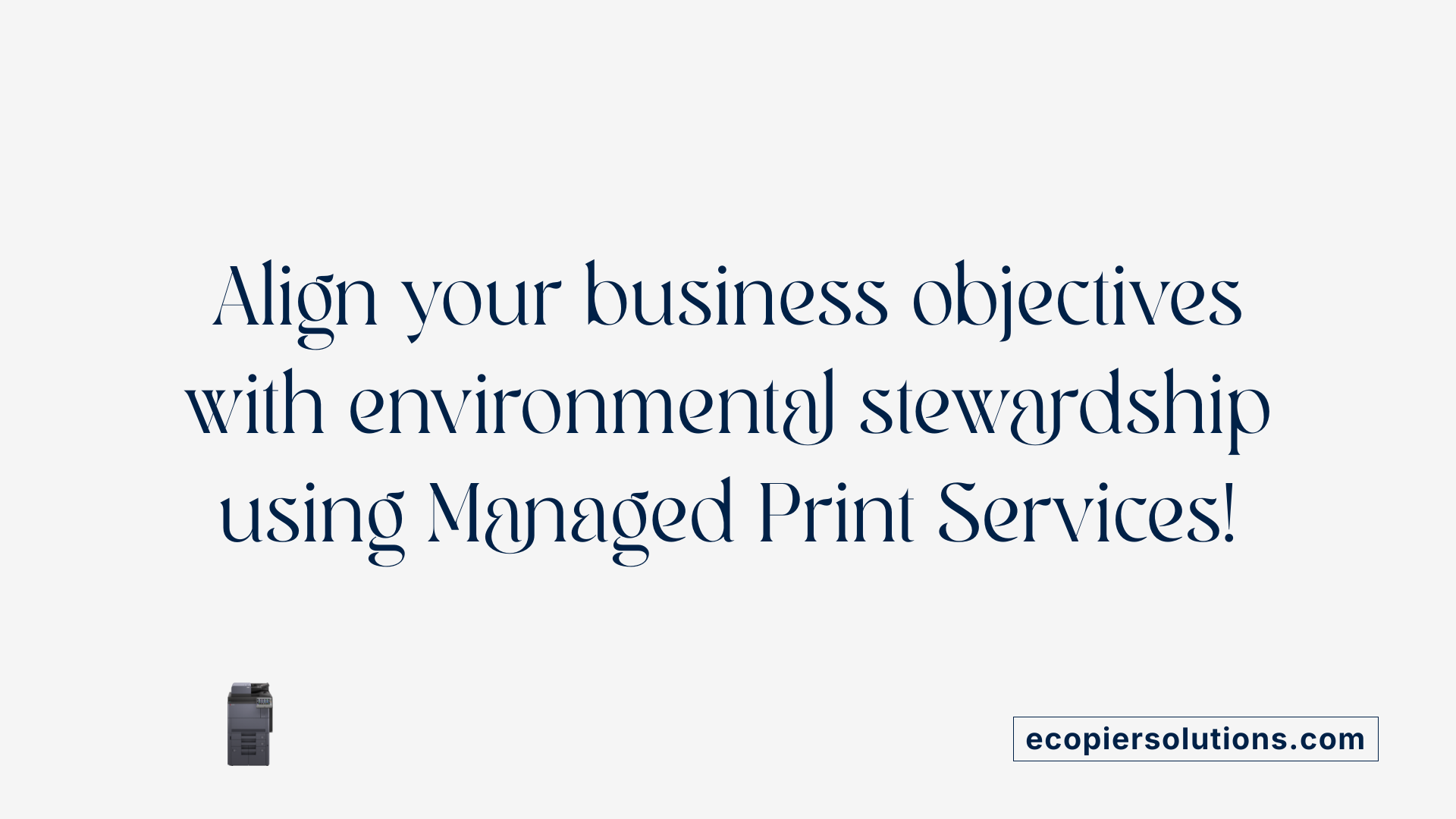Introduction to Managed Print Services and Sustainability
In the evolving landscape of corporate responsibility, companies are increasingly looking to balance productivity with environmental stewardship. Managed Print Services (MPS) are pivotal in transforming traditional office environments into sustainable hubs, by facilitating eco-friendly practices that reduce waste and conserve energy. This article explores the multifaceted role MPS plays in fostering sustainability within office settings, offering insights into how organizations can leverage these services to meet their environmental and efficiency goals.
MPS: Pioneering Green Office Solutions

What is the role of Managed Print Services in advancing sustainable office practices?
Managed Print Services (MPS) play a vital role in advancing sustainable office practices by implementing eco-friendly printing solutions that cut waste and energy consumption. With the increasing emphasis on sustainability, MPS aids organizations in adopting efficient practices, such as duplex printing, which significantly reduces paper usage. By shifting towards digital workflows and automating document management, MPS facilitates a transition to a paperless environment while promoting responsible printing habits.
MPS also encompasses programs like Xerox's Supplies Recycling and the PrintReleaf initiative. These initiatives not only promote recycling efforts but also contribute to reforestation by planting a tree for every page printed, thereby helping to conserve natural resources. Furthermore, MPS providers actively monitor and analyze carbon emissions associated with printing activities, allowing businesses to identify wasteful printing habits and optimize their operations for better resource management.
Ultimately, Managed Print Services support environmental conservation while enhancing a company’s reputation. As sustainability becomes increasingly important in business performance—projected to rise from 41% to 68% by 2025—MPS positions organizations to meet and exceed these emerging demands for eco-conscious practices.
Environmental Benefits of Managed Print Services

How do Managed Print Services provide environmental benefits?
Managed Print Services (MPS) offer robust environmental advantages that significantly contribute to sustainability efforts within organizations. By implementing strategies such as duplex printing, MPS reduces overall paper consumption. This practice allows printing on both sides of the paper, effectively halving paper usage in many cases, which is crucial given that the average employee prints approximately 10,000 sheets annually.
Moreover, MPS promotes energy-efficient printers which can lower energy consumption and carbon emissions by as much as 60%. These devices not only enhance operational efficiency but also support organizations in meeting their sustainability goals.
What recycling and waste management initiatives are included in MPS?
Recycling and waste management are central to the services provided by MPS. Programs like the Xerox® Supplies Recycling Program ensure proper disposal and recycling of toner cartridges, which greatly diminishes landfill waste. MPS also includes features for managing excess print jobs and optimizing usage to minimize waste further.
Additionally, MPS utilizes automated workflows to digitize paper documents, enabling organizations to transition towards paperless environments. This shift not only conserves resources but also reduces the overall environmental footprint.
Embracing MPS enables businesses to make substantial improvements in their ecological impacts while enhancing their brand reputation among sustainable-oriented consumers.
Achieving Operational Excellence Through MPS

In what ways do Managed Print Services enhance operational efficiency?
Managed Print Services (MPS) significantly enhance operational efficiency through various methods aimed at optimizing print needs. One primary advantage is the streamlining of print infrastructure, which alleviates the administrative burdens associated with managing printers and related tasks. This allows organizations to concentrate on their core business functions.
MPS providers implement robust document output management systems utilizing advanced technologies to facilitate seamless printing processes. This not only minimizes downtime but also boosts productivity. For example, proactive maintenance provided by MPS ensures that printers are functioning optimally, thus reducing the chances of operational disruptions.
Another critical aspect is the tailored assessments conducted by MPS providers. By evaluating printing habits, MPS solutions implement strategies such as print quotas and duplex printing to minimize waste. Organizations can experience significant cost reductions, often ranging between 20-30% on their overall print-related expenses.
Enhanced security measures are also a vital component of MPS, protecting sensitive documents and ensuring compliance with industry regulations. This addresses potential vulnerabilities typically present in conventional print setups.
Moreover, MPS contributes to sustainability efforts, which, in today's business world, is increasingly crucial. By reducing energy consumption and carbon emissions, organizations can foster more environmentally responsible operations while still meeting their productivity goals.
| Benefit | Description | Impact |
|---|---|---|
| Streamlined Infrastructure | Simplifies print management tasks, allowing focus on core activities. | Increases productivity |
| Proactive Maintenance | Prevents downtime by ensuring printers are well-maintained and operational. | Reduces operational disruptions |
| Cost Savings | Tailored assessments lead to strategies that cut print-related expenses by 20-30%. | Enhances budget management |
| Enhanced Security | Protects sensitive information and ensures compliance with regulations. | Mitigates risks |
| Sustainability Commitment | Reduces energy usage and carbon footprint, supporting eco-friendly business practices. | Improves corporate image |
Strategies for Implementing Sustainable MPS

What are the strategies and benefits of implementing Managed Print Services to support workplace sustainability initiatives?
Implementing Managed Print Services (MPS) to foster workplace sustainability entails a strategic approach. One of the foremost tactics is conducting print audits. These audits allow organizations to dissect their current printing practices, identifying underutilized devices and wasteful habits. By understanding the print landscape, businesses can optimize their printer infrastructure, ensuring that resources are effectively utilized.
Moreover, integrating eco-friendly supplies such as remanufactured cartridges and sustainable inks can further align printing activities with environmental goals. By encouraging practices like duplex printing and utilizing digital document management systems, organizations can achieve substantial reductions in paper waste. For example, implementing duplex printing can cut paper usage by up to 50%, playing a key role in lowering the overall carbon footprint.
How does employee training contribute to sustainable printing practices?
Employee training is another vital component of a successful MPS strategy. Educating staff on eco-friendly printing practices fosters a culture of sustainability. Training can cover topics such as:
- Efficient use of print resources
- The importance of reducing paper waste
- The benefits of reporting unnecessary print jobs
- Instructions on utilizing digital workflows
By promoting energy conservation through the adoption of energy-efficient hardware and offering tools that track carbon footprints, MPS can significantly lower energy consumption and enhance resource management. The partnership can also implement toner recycling programs, ensuring proper disposal of waste and reinforcing sustainable practices.
In conclusion, MPS not only contributes to operational efficiency and regulatory compliance but also leads to substantial cost savings and better resource conservation, making it an integral part of modern business sustainability initiatives.
Aligning Business Goals with Environmental Stewardship

Optimizing Printing to Reduce Carbon Footprint
Managed Print Services (MPS) provide organizations with comprehensive solutions to evaluate and enhance their printing practices. By promoting energy-efficient devices, such as Energy Star-certified printers, MPS reduces overall energy consumption and lowers operational costs. One effective strategy is implementing duplex printing, which allows printing on both sides of the page and can cut paper usage by up to 50%.
Additionally, MPS utilizes analytics and print monitoring tools to track usage, helping organizations identify wasteful printing habits. By enforcing policies like default double-sided printing and setting print quotas, MPS actively engages businesses in reducing unnecessary print jobs and conserving resources.
Partnering with Initiatives like PrintReleaf
One standout feature of MPS is the partnership with initiatives such as PrintReleaf, which support global reforestation projects. For every page printed, PrintReleaf contributes to planting trees, directly offsetting the environmental impact of office printing. This commitment not only contributes to sustainability goals but also enhances a company's reputation among eco-conscious consumers.
MPS encourages the use of sustainable materials, like recycled paper and eco-friendly inks, further minimizing ecological impacts. By combining these practices, Managed Print Services align business efficiencies with environmental stewardship, ensuring a thriving, resource-conscious future.
| Component | Benefits | Examples |
|---|---|---|
| Energy-efficient Devices | Reduces energy consumption and costs | Energy Star-certified printers |
| Duplex Printing | Cuts paper usage significantly | 50% reduction in paper waste |
| Sustainability Programs | Offsets carbon emissions through reforestation | PrintReleaf’s tree planting |
| Eco-friendly Materials | Minimizes impact through responsible sourcing | Recycled paper, eco-friendly inks |
| Monitoring and Analytics | Identifies wasteful practices and improves efficiency | Print usage tracking tools |
Conclusion: The Future of Managed Print Services and Sustainability
As businesses face increasing pressure to operate sustainably, Managed Print Services offer a robust solution for reducing environmental impact while improving efficiency and reducing costs. These services enable companies to align with eco-conscious practices by optimizing their print environments, adopting energy-efficient technologies, and participating in global sustainability initiatives. By choosing MPS, organizations not only enhance their operational capabilities but also solidify their commitment to environmental stewardship, meeting both their bottom line and the growing demand for sustainable business practices. Embracing MPS is not just a step towards efficiency but a stride towards a greener future.
References
- The role of managed print services in sustainable business practices
- How Managed Print Services Help Save the Environment - Toshiba
- The role of managed printing services in sustainable business ...
- How Managed Print Services are Helping Safeguard our Planet for ...
- 6 ways managed print and automation services can help you create ...
- Managed Print Services: Sustainability Benefits - Xerox
- Sustainable Business Solutions: Managed Print Services
- How Managed Print Services Can Reduce Paper Use, Cut Costs ...
- Enhancing Business with Green Technology in Print Management
- Reducing Environmental Impact with Sustainable Printing Practices































